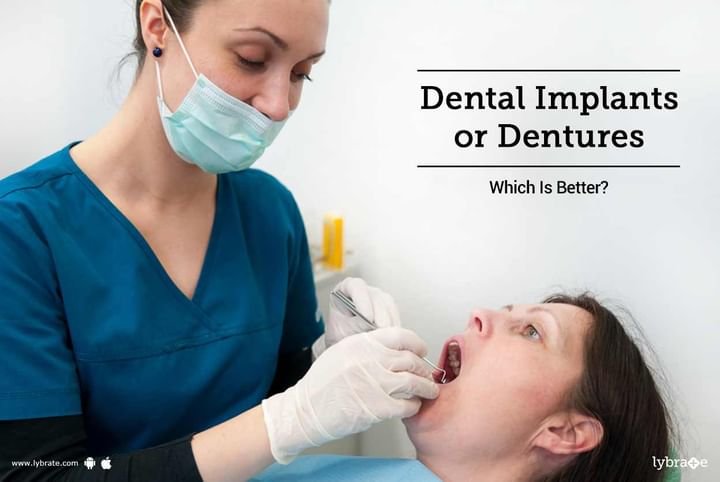Dental Implants Or Dentures - Which Is Better?
Tooth loss occurs due to various reasons – decay and infection, fracture, accidents, gum disease, to name a few. Tooth loss has a negative impact on various aspects - facial appearance, chewing efficiency, and overall nutrition. The attempts to restore the lost tooth have led to various advancements from removable dentures to cast partial dentures to fixed dentures to implants.
Listed below are features (covering advantages and disadvantages) of both dentures (fixed and removable) and implants. While dentures can be complete or partial, implants are more often partial, of course, can be used to replace multiple teeth. A detailed discussion with your dentist along with oral and radiographic examination will help in making a decision.
Removable Dentures:
Advantages:
-
Replaces tooth but more for cosmetic reasons than function.
-
Poor chewing efficiency.
-
Useful when multiple teeth are to be replaced, especially when no adjacent teeth are available for support.
-
If good bone support is not available, retention is an issue.
-
Not very healthy for the underlying jaw bone and adjacent gums.
-
Requires daily and routine maintenance.
Fixed Denture(s):
Also called as bridges, as the artificial replaced tooth is a bridge between two natural teeth.
-
Requires removal of sound tooth structure as abutment (support). This is the major disadvantage with fixed dentures, which promoted further work from the dentists, ending up with discovery of implants.
-
Promotes tooth decay in the adjacent teeth.
-
Good support, so retention is not an issue.
-
Not as harmful to the underlying jaw bone as a removable denture.
-
Requires maintenance but not like the removable denture.
-
Expensive compared to removable dentures.
-
Replacing a bridge also means the adjacent healthy teeth are affected.
Implants:
-
Very good replacement alternative, replaces not just the crown structure but also the root structure.
-
An excellent option when the jaw bones and gums are extremely in good condition.
-
Almost natural restoration of both chewing efficiency and facial appearance, the person can eat almost anything.
-
Not as harmful on the gums like dentures.
-
Does not cause bone loss like dentures.
-
Can be used to replace single or multiple teeth, where multiple implants are placed and a bridge is placed over them.
-
The titanium screws that are used fuse with the jaw bone over a period of time.
-
The titanium is also biocompatible, thereby reducing chances of allergy.
-
Implants are expensive, and many insurance companies may not cover them.
-
If properly fabricated and maintained well, then it can last for decades.
The decision to go for a denture or for an implant should be decided based on a detailed evaluation of overall health and if required radiographic examination. Both dentures and implants have advantages and disadvantages, and the dentist will help make the right choice.



+1.svg)
